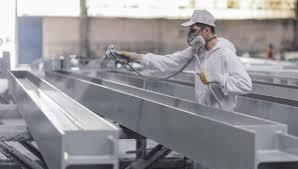Industrial Coating Market Evolution Fueled by Sustainable Coatings and Environmental Compliance Pressures

The industrial coating market is undergoing a transformative evolution, driven by the increasing adoption of sustainable coatings and mounting environmental compliance pressures. Industries worldwide are seeking solutions that not only deliver high performance but also align with strict environmental regulations and corporate sustainability goals. This shift is reshaping the way coatings are formulated, applied, and evaluated across sectors such as automotive, construction, aerospace, and energy.
Drivers of Sustainable Coating Adoption
Environmental regulations are becoming increasingly stringent globally, targeting emissions of volatile organic compounds (VOCs), hazardous air pollutants, and toxic chemicals commonly found in traditional coatings. These regulations are compelling manufacturers to develop low-VOC, waterborne, high-solids, and solvent-free coatings that minimize environmental impact without compromising performance.
Corporate sustainability initiatives are also driving adoption. Organizations are increasingly focused on reducing their carbon footprint, improving lifecycle performance, and demonstrating eco-responsibility to stakeholders. Sustainable coatings, with lower emissions and longer lifespans, offer a clear way to achieve these objectives.
Technological Advancements in Sustainable Coatings
The evolution of the industrial coating market has been fueled by technological innovations that enable high performance while maintaining eco-friendly profiles:
-
Waterborne Coatings: These coatings use water as the primary solvent, significantly reducing VOC emissions and environmental hazards. Modern formulations now match the durability and aesthetic appeal of traditional solvent-based systems, making them increasingly popular in automotive, furniture, and industrial machinery applications.
-
Powder Coatings: Powder coatings are solvent-free and generate minimal waste during application. They offer exceptional durability, corrosion resistance, and uniform finishes, making them ideal for heavy machinery, automotive parts, and architectural structures.
-
High-Solids and Low-VOC Coatings: High-solids coatings reduce the amount of solvent required, maintaining coating performance while decreasing environmental impact. Low-VOC formulations are gaining traction in both industrial and consumer applications due to stricter regulatory standards.
-
Bio-Based Coatings: Incorporating renewable materials such as plant oils, natural resins, and bio-polymers, bio-based coatings are becoming an attractive alternative to traditional petroleum-based products. They offer sustainability benefits while maintaining protective and functional properties.
Impact Across Industries
Automotive and Transportation
The automotive industry is witnessing widespread adoption of sustainable coatings due to regulatory pressure and consumer demand for greener vehicles. Waterborne and high-solids coatings are increasingly used for car bodies, interiors, and components, offering corrosion protection, aesthetic appeal, and environmental compliance. Electric vehicles (EVs) particularly benefit from lightweight, eco-friendly coatings that contribute to energy efficiency.
Construction and Infrastructure
In construction, sustainable coatings enhance the longevity of structures while minimizing environmental impact. Low-VOC paints and coatings for concrete, steel, and facades not only provide durability but also comply with green building certifications like LEED and BREEAM. Reflective coatings that reduce heat absorption are also gaining popularity for energy-efficient buildings.
Aerospace
Aerospace applications demand coatings that can withstand extreme temperatures, UV radiation, and corrosive conditions. Sustainable coatings in aerospace combine high performance with reduced emissions, supporting both operational efficiency and environmental compliance.
Energy and Heavy Industries
Oil, gas, and renewable energy sectors are adopting environmentally compliant coatings to protect infrastructure from corrosion, wear, and chemical exposure. Sustainable coatings help maintain equipment performance while reducing environmental hazards associated with maintenance and disposal.
Regulatory Pressures Shaping the Market
Regulatory frameworks worldwide are critical drivers in the evolution of the industrial coating market. VOC limits, hazardous substance restrictions, and reporting requirements are forcing manufacturers to innovate and adopt greener alternatives. Compliance is no longer optional; it has become a critical component of business strategy, pushing companies toward sustainable practices in formulation, application, and lifecycle management.
Future Trends and Opportunities
The industrial coating market is expected to continue evolving with a focus on sustainability and environmental compliance. Key trends include:
-
Smart Sustainable Coatings: Coatings that respond to environmental stimuli or have self-healing properties are gaining traction in sectors like automotive and aerospace.
-
Digital Integration: Advanced application techniques and monitoring technologies allow for precision application, reduced waste, and improved regulatory reporting.
-
Circular Economy Initiatives: Manufacturers are exploring recyclable coatings and reusable materials to support circular business models, reducing overall environmental impact.
-
Emerging Markets: Rapid industrialization in Asia-Pacific and Latin America is driving demand for eco-friendly coatings in automotive, construction, and manufacturing sectors.
Conclusion
The industrial coating market is being reshaped by the twin forces of sustainability and environmental compliance. Advances in waterborne, powder, high-solids, and bio-based coatings are enabling industries to meet regulatory requirements while maintaining high performance. As environmental concerns intensify and regulatory frameworks tighten, the adoption of sustainable coatings will continue to grow, driving innovation, efficiency, and long-term value across automotive, aerospace, construction, and energy sectors. The future of the industrial coating market is firmly aligned with sustainability, regulatory adherence, and technological advancement.






